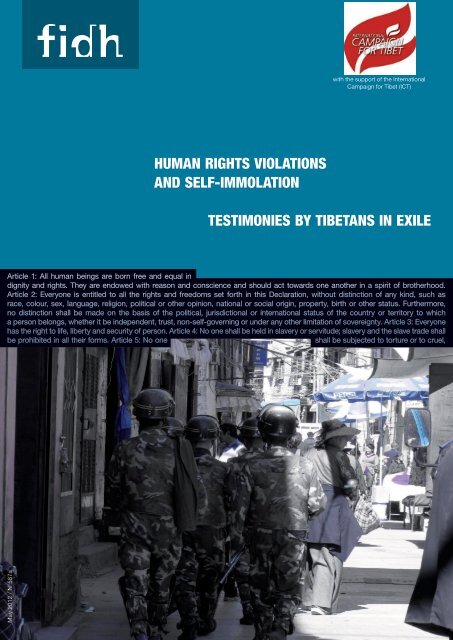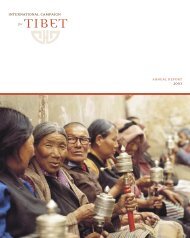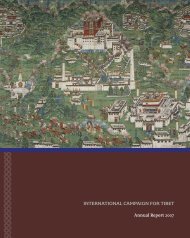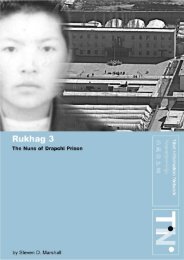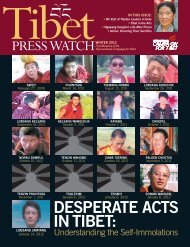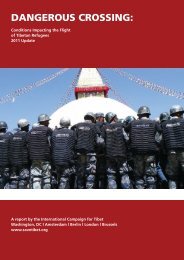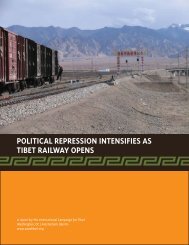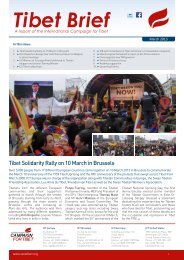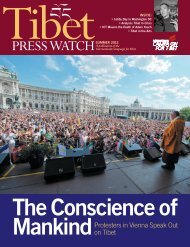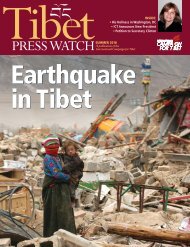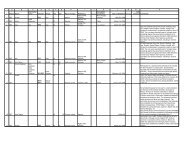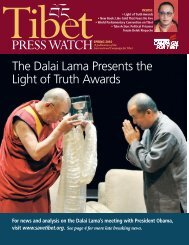to download PDF report. - Tibet Policy
to download PDF report. - Tibet Policy
to download PDF report. - Tibet Policy
Create successful ePaper yourself
Turn your PDF publications into a flip-book with our unique Google optimized e-Paper software.
with the support of the International<br />
Campaign for <strong>Tibet</strong> (ICT)<br />
Human rights violations<br />
and self-immolation<br />
Testimonies by <strong>Tibet</strong>ans in exile<br />
Article 1: All human beings are born free and equal in<br />
dignity and rights. They are endowed with reason and conscience and should act <strong>to</strong>wards one another in a spirit of brotherhood.<br />
Article 2: Everyone is entitled <strong>to</strong> all the rights and freedoms set forth in this Declaration, without distinction of any kind, such as<br />
race, colour, sex, language, religion, political or other opinion, national or social origin, property, birth or other status. Furthermore,<br />
no distinction shall be made on the basis of the political, jurisdictional or international status of the country or terri<strong>to</strong>ry <strong>to</strong> which<br />
a person belongs, whether it be independent, trust, non-self-governing or under any other limitation of sovereignty. Article 3: Everyone<br />
has the right <strong>to</strong> life, liberty and security of person. Article 4: No one shall be held in slavery or servitude; slavery and the slave trade shall<br />
be prohibited in all their forms. Article 5: No one<br />
shall be subjected <strong>to</strong> <strong>to</strong>rture or <strong>to</strong> cruel,<br />
May 2012 / N°587a
Map of <strong>Tibet</strong>an self-immolations (2009-2012). Source: ICT<br />
Introduction ----------------------------------------------------------------------------------------------- 3<br />
Six testimonies from <strong>Tibet</strong>ans in exile ---------------------------------------------------------------- 5<br />
Recommendations <strong>to</strong> the international community-------------------------------------------------- 9<br />
2 / Human rights violations and self-immolation: testimonies by <strong>Tibet</strong>ans in exile
Introduction<br />
Fifty years after the brutal crackdown that lead the Dalai Lama and tens of thousands of <strong>Tibet</strong>ans <strong>to</strong><br />
escape from <strong>Tibet</strong> <strong>to</strong> India, the self-immolation of a young <strong>Tibet</strong>an monk from Kirti Monastery in<br />
Sichuan Province on 27 February 2009 marked the beginning of a new form of protest against the severe<br />
repression imposed by the People’s Republic of China (PRC) on the people of <strong>Tibet</strong>. Between 16 March<br />
2011 and 20 April 2012, the self-immolation of 34 more people, most of whom died, has revealed the<br />
degree of tension that prevails in the region. It also overwhelmingly suggests that the PRC’s policy for<br />
dealing with the <strong>Tibet</strong> question has failed.<br />
Self-immolations in <strong>Tibet</strong>: an overview<br />
The number of self-immolations by <strong>Tibet</strong>ans in the Ngawa <strong>Tibet</strong>an and Qiang Au<strong>to</strong>nomous Prefecture, 1<br />
Sichuan Province, is higher than anywhere else in <strong>Tibet</strong>. Twenty five <strong>Tibet</strong>ans have set fire <strong>to</strong> themselves<br />
in this region since 27 February 2009, out of a <strong>to</strong>tal of 35 self-immolations up <strong>to</strong> 20 April 2012. Of these<br />
25 self-immola<strong>to</strong>rs, 15 (including the first, Tapey), were monks or former monks from Kirti monastery.<br />
Kirti monastery is one of the most important and influential monasteries in <strong>Tibet</strong>. It has been subject <strong>to</strong><br />
heightened surveillance, police control (including military lockdown), the forced removal of monks, the<br />
imposition of ‘patriotic education’, and other internal management strictures, since at least 16 March<br />
2008, when Chinese forces opened fire on unarmed <strong>Tibet</strong>an protesters in Ngaba <strong>to</strong>wn, and their bodies<br />
were brought <strong>to</strong> Kirti monastery.<br />
In <strong>to</strong>tal, 25 self-immola<strong>to</strong>rs are known <strong>to</strong> have died following their protest; of all 35 self-immola<strong>to</strong>rs, 30<br />
were men and 5 were women.<br />
(Source: ICT)<br />
What are the causes of such unprecedented acts of protest? Despite China’s tight control over the media<br />
and information coming out of <strong>Tibet</strong>, data received from reliable inside sources makes it clear that human<br />
rights abuses in <strong>Tibet</strong> are widespread. Such abuses include not only the severe repression of any form<br />
of protest, arbitrary arrests and <strong>to</strong>rture in detention, but also violations of freedom of religion, belief<br />
and association. <strong>Tibet</strong>ans in <strong>Tibet</strong> are prevented from freely practicing Buddhism. Monks are regularly<br />
threatened and put under pressure. Young <strong>Tibet</strong>ans are forced <strong>to</strong> seek authorization <strong>to</strong> become monks from<br />
central authorities and their overall number is regulated by the imposition of quotas and the issuance of<br />
permits and restrictions. The <strong>Tibet</strong>an identity is further oppressed by sophisticated techniques such as the<br />
use of ‘patriotic education’ sessions. These correspond <strong>to</strong> a set of systematic interrogation and thoughtinfluencing<br />
techniques (such as publicly reciting political literature) <strong>to</strong> make subjects denounce the exiled<br />
<strong>Tibet</strong>an leader the Dalai Lama as a ‘separatist’, and demonstrate the allegiance of the <strong>Tibet</strong>an people <strong>to</strong> the<br />
Chinese government and <strong>to</strong> Gyaincain Norbu, the government-picked 11th Panchen Lama. 2<br />
1. The region is his<strong>to</strong>rically part of one of three traditional regions of <strong>Tibet</strong>, Amdo; the other two regions being Kham (Khampa)<br />
and U-Tsang (Central <strong>Tibet</strong>).<br />
2. One of the most important religious leaders in <strong>Tibet</strong>. In 1995 the Dalai Lama recognized 5-year-old Gedhun Choekyi Nima<br />
as the 11th reincarnation of the Panchen Lama. Shortly thereafter the Chinese government <strong>to</strong>ok the young boy in<strong>to</strong> cus<strong>to</strong>dy<br />
and appointed its own Panchen Lama, Gyaltsen Norbu, viewed by most <strong>Tibet</strong>ans as a puppet of the State. Gedhun Choekyi<br />
Nima is still missing. For more information on the Panchen Lama and religious repression in <strong>Tibet</strong> please see the ICT <strong>report</strong><br />
(http://www.savetibet.org/documents/<strong>report</strong>s/communist-party-living-buddha)<br />
Human rights violations and self-immolation: testimonies by <strong>Tibet</strong>ans in exile / 3
In 1996, the first major wave of re-education campaigns was launched in <strong>Tibet</strong> for the first time since<br />
the Cultural Revolution in the 1960s. It was extended in 1998. The current wave of repression started in<br />
March 2008 when Chinese authorities launched an intensified crackdown on protests that had erupted<br />
all over <strong>Tibet</strong>, bringing thousands of people <strong>to</strong> the streets in hundreds of peaceful protests against the<br />
suppression of their fundamental rights. There were <strong>report</strong>s of excessive use of force by government<br />
security personnel. Many were killed and some of those arrested after the riots were subject <strong>to</strong> illegal<br />
forms of punishment such as severe beatings and deprivation of food, water, and sleep for long periods.<br />
Like other minority groups in China, 3 <strong>Tibet</strong>ans feel their culture, language and way of life are marginalized<br />
by an authoritarian government dominated by Han Chinese. Government policies include the large-scale<br />
settlement of Han Chinese in local communities, heavy restrictions on freedom of movement and the<br />
forced relocation of nomadic communities from their grasslands <strong>to</strong> small <strong>to</strong>wns, where they are cut off<br />
from their traditional ways of life. As a result, thousands of <strong>Tibet</strong>ans each year flee their homeland due<br />
<strong>to</strong> the repressive atmosphere that prevails there. They risk their lives <strong>to</strong> cross <strong>to</strong> Nepal or India – a risk<br />
that has heightened since Chinese security forces have tightened border controls following the March<br />
2008 crackdown.<br />
This <strong>report</strong>, prepared by the International Federation for Human Rights (FIDH) in partnership with the<br />
International Campaign for <strong>Tibet</strong> (ICT), presents a selection of six testimonies from <strong>Tibet</strong>an asylum<br />
seekers in Europe. The testimonies are based on thirty interviews carried out by FIDH throughout 2011 in<br />
Belgium, France and Switzerland – the three European countries hosting the largest number of <strong>Tibet</strong>ans.<br />
It aims <strong>to</strong> contribute <strong>to</strong> documenting human rights violations in <strong>Tibet</strong> in a context where independent<br />
observers, foreign researchers, human rights activists and journalists are not allowed <strong>to</strong> operate in the<br />
country.<br />
Names have been changed for the protection of the <strong>Tibet</strong>an asylum seekers and their families still living<br />
in the People’s Republic of China.<br />
3. As per official figures, 55 ethnic minorities occupying 63.7% of the mainland along the greater part of the border make up<br />
around 8.5% of the entire Chinese population.<br />
4 / Human rights violations and self-immolation: testimonies by <strong>Tibet</strong>ans in exile
Six testimonies from<br />
<strong>Tibet</strong>ans in exile<br />
S<strong>to</strong>ry 1: Tashi<br />
Until a few years ago, Tashi was a monk. In the monastery where he used <strong>to</strong> stay, there was an even<br />
number of monks and watchers. The watchers’ role was <strong>to</strong> <strong>report</strong> everything that happened within<br />
the monastery. One day, Tashi saw a group of Chinese watchers smoking inside the monastery. He<br />
explained <strong>to</strong> them that smoking was forbidden. Tashi says that this led him <strong>to</strong> be labeled as a separatist<br />
and isolated in an individual cell for 20 days, during which time he had <strong>to</strong> attend daily patriotic<br />
education sessions. Officials asked him why he hated his government and why he was involved in<br />
separatist activities. They asked him <strong>to</strong> hand write a denunciation of the Dalai Lama. He refused on<br />
two occasions. Officials threatened that if he did not do so, he would be expelled from the monastery<br />
and sent <strong>to</strong> prison. They also threatened <strong>to</strong> arrest other monks. Cowed, Tashi wrote what he was <strong>to</strong>ld.<br />
This brought the patriotic education sessions <strong>to</strong> an end, but he was expelled from the monastery.<br />
Tashi returned <strong>to</strong> his parents’ home before going <strong>to</strong> Lhasa. The monastery had previously sent him<br />
<strong>to</strong> Lhasa for a year <strong>to</strong> learn Chinese, hoping he could serve as an intermediary between the monks<br />
and the Han authorities, but he had instead learned English. During his stay in Lhasa, he had met<br />
foreigners and wanted <strong>to</strong> become a guide, but this required government authorization. No former<br />
monks were allowed <strong>to</strong> apply. Tashi arrived in Lhasa with no resident or work permits. He stayed at<br />
a friend’s house and helped in his restaurant.<br />
On 14 March 2008, Tashi was in a tea shop in the Barkhor district, the old center of Lhasa, drinking<br />
tea with some friends. A group of <strong>Tibet</strong>ans rushed in and said that a group of monks peacefully<br />
protesting in front of the Ramoche temple had been arrested and were being treated brutally by the<br />
police. The monks had been asking for the release of fellow monks, imprisoned several days earlier.<br />
Tashi and his friends ran in<strong>to</strong> the street and saw <strong>Tibet</strong>ans arriving from every direction. By the time<br />
they arrived at the temple, the Chinese army was already in place, throwing teargas, their sticks and<br />
guns drawn and ready <strong>to</strong> use. The atmosphere became increasingly tense as monks and lay people<br />
continued <strong>to</strong> pour in<strong>to</strong> the streets, asking for the monks <strong>to</strong> be released. Suddenly, the slogans changed.<br />
He could hear people shouting for freedom and calling for the Chinese <strong>to</strong> leave <strong>Tibet</strong>. Tashi joined in<br />
when suddenly gunshots were fired. A teargas canister landed nearby and his eyes and throat started<br />
<strong>to</strong> burn. People were running in every direction. He heard the sound of bullets whirring past his ears.<br />
He saw an old <strong>Tibet</strong>an lady fall <strong>to</strong> the ground just in front of him, blood covering her head. He ran.<br />
Soldiers and policemen were everywhere arresting people. By nightfall Tashi had not reached home.<br />
He was hiding at a street corner with a group of young <strong>Tibet</strong>ans, when a door opened and a Chinese<br />
lady he had met a few days earlier urged him <strong>to</strong> come inside. Just as he entered her home, a group of<br />
Chinese police officers saw some <strong>Tibet</strong>ans and charged on them, shooting one down and beating up<br />
the others. With guns pointed in their faces, these persons were all brutally taken away. The Chinese<br />
lady helped Tashi <strong>to</strong> leave <strong>Tibet</strong> for Yunnan province. She hid him there for over a year before<br />
managing <strong>to</strong> get his travel documents <strong>to</strong>gether and finally putting him on a plane <strong>to</strong> France.<br />
Human rights violations and self-immolation: testimonies by <strong>Tibet</strong>ans in exile / 5
S<strong>to</strong>ry 2: Nyima<br />
Nyima used <strong>to</strong> be a monk in a monastery in Amdo, Qinghai province. At the age of 14, after attending<br />
the village school for five years (with classes in <strong>Tibet</strong>an), he was sent away <strong>to</strong> a bigger school where<br />
he saw Han Chinese for the first time. The majority of his classes were in Chinese and he felt isolated.<br />
After two years he left school <strong>to</strong> become a monk. The central government granted him authorization<br />
and he entered a nearby monastery of about 200 monks, where he learned poetry, traditional debating<br />
techniques and <strong>Tibet</strong>an his<strong>to</strong>ry. On one occasion, a monk came back from India, bringing a handwritten<br />
book of teachings of the Dalai Lama as well as the symbol of the <strong>Tibet</strong>an government in exile.<br />
The book was pho<strong>to</strong>copied and handed out <strong>to</strong> other monks within the monastery. Soon, copies were<br />
circulating in other monasteries.<br />
When police officers discovered copies of the book, their search brought them <strong>to</strong> Nyima’s monastery.<br />
Everyone was interrogated. Nyima was warned that he was endangering his entire future. He was<br />
pushed around, but not beaten. Police collected information on his family members and questioned<br />
them as well. The surveillance was such that Nyima decided he couldn’t stay in the monastery<br />
anymore. His parents sent him <strong>to</strong> India <strong>to</strong> get a <strong>Tibet</strong>an education and enjoy religious freedom. Nyima<br />
left <strong>Tibet</strong> with a group of 25 <strong>Tibet</strong>ans and a guide. The snow was falling so hard they could barely go<br />
on. The guide said they had <strong>to</strong> turn back or all freeze <strong>to</strong> death, but Nyima refused. Six days later he<br />
and ten other <strong>Tibet</strong>ans arrived in Nepal and registered at a refugee center in Kathmandu. He does not<br />
know how many turned back or were lost on the way.<br />
S<strong>to</strong>ry 3: Dekyi<br />
Dekyi grew up in Kham, North-Eastern <strong>Tibet</strong>. There were no schools in her area, but Dekyi’s father<br />
taught her how <strong>to</strong> read and write before and after daily chores.<br />
Dekyi got married and had three children. She was at home when a group of Chinese officials came<br />
<strong>to</strong> search the family tent. Two <strong>to</strong> three times a year, Chinese security forces would go and search the<br />
tents of every nomadic group or clan, looking for flags, CDs of religious teachings from India and<br />
pictures of the Dalai Lama. In Dekyi’s tent they found a picture of the Dalai Lama hidden behind a<br />
picture of another Lama who had not fled <strong>Tibet</strong> and <strong>to</strong> whom <strong>Tibet</strong>ans were allowed <strong>to</strong> direct their<br />
prayers. The police were about <strong>to</strong> arrest her husband, when Dekyi said the picture was her own and<br />
that her husband knew nothing about it. In the following months, Dekyi was frequently summoned<br />
<strong>to</strong> the police station, or interrogated at home. Officials accused her of having connections with the<br />
<strong>Tibet</strong>an government in exile and of being a separatist. She denied being a separatist and explained<br />
that having the pho<strong>to</strong> was only part of her religious beliefs. Nevertheless, Dekyi continued <strong>to</strong> be<br />
questioned over and over. She lived in constant fear of being sent <strong>to</strong> prison, wrongly accused of being<br />
a separatist. She finally decided <strong>to</strong> flee <strong>Tibet</strong>.<br />
With her husband’s help, Dekyi secretly started <strong>to</strong> sell some of their precious jewelry, which all<br />
<strong>Tibet</strong>an families possess, and prepared for her escape. Dekyi and her husband wanted <strong>to</strong> go <strong>to</strong>gether<br />
with their children, but they would have attracted <strong>to</strong>o much attention; so Dekyi left alone.<br />
She joined a group of nine people, including a guide. It <strong>to</strong>ok them 16 days of intense walking <strong>to</strong><br />
reach Nepal. Before reaching the border, they all threw away their identity papers as Nepali police<br />
sometimes send <strong>Tibet</strong>ans back <strong>to</strong> China if they have proof of Chinese citizenship. Dekyi remembers<br />
intense cold and exhaustion. She remembers her deep relief at the fact that, just as she started believing<br />
she would never make it, the entire group made it safely across the Nepalese border with no losses<br />
or serious injuries.<br />
6 / Human rights violations and self-immolation: testimonies by <strong>Tibet</strong>ans in exile
S<strong>to</strong>ry 4: Yangzom<br />
Yangzom used <strong>to</strong> live in her uncle’s home in Lhasa with her father, brother and sister. Her family<br />
had left their old farmer’s house in Kham without authorization after her mother had died and the<br />
Chinese authorities had requested <strong>to</strong> use part of their house as an arms depot. Yangzom’s uncle was<br />
a merchant in Lhasa, and they were allowed stay at his home in exchange for an annual contribution<br />
<strong>to</strong> the government who issued them a one-year authorization permit. However, this arrangement was<br />
not indicated in their hukou, or residence permit. As a result, the children were not allowed <strong>to</strong> go <strong>to</strong><br />
school. Yangzom’s father and sister helped their uncle, while she stayed at home and helped <strong>to</strong> look<br />
after his children.<br />
In 1989, Yangzom was 15-year old. She was in front of her home near the Barkhor district office in<br />
Lhasa waiting for a friend, when a group of <strong>Tibet</strong>an protesters came in her direction shouting “give<br />
us back our lamas, free our lamas”. Three of the higher <strong>Tibet</strong>an Lamas had been arrested the previous<br />
day. Security forces arrived from all sides. Caught in the small crowd, Yangzom saw the security<br />
forces open fire on the peaceful protesters. Everyone started running everywhere, trying <strong>to</strong> escape<br />
through side streets. Yangzom heard bullets whir by her head. People screamed and bodies fell. An<br />
old woman grabbed her arm and pulled her in<strong>to</strong> a dark alleyway. Trembling, she went back home. A<br />
couple of hours later, the police went door-<strong>to</strong>-door for a cordon and search operation, and arrested<br />
many people. They came <strong>to</strong> Yangzom’s house and <strong>to</strong>ok her father, who was detained for a few days.<br />
Later that year, she <strong>to</strong>ld two of her friends about her dream of going <strong>to</strong> India <strong>to</strong> see the Dalai Lama<br />
and go <strong>to</strong> school.<br />
Yangzom left Lhasa with two older girls she knew. They left without saying anything <strong>to</strong> anyone, in<br />
order not <strong>to</strong> put their families in danger. All they had was their jewelry. They had <strong>to</strong> sell one precious<br />
pearl after another. Not knowing their value, they exchanged rare turquoises and other precious<br />
s<strong>to</strong>nes for a loaf of bread or a night at a stable.<br />
S<strong>to</strong>ry 5: Phuntsok<br />
Phuntsok grew up in a family of dissidents. Both his grandfather and an uncle had died in direct<br />
confrontation with the Chinese during the 1950s and 1960s. Another uncle was dispatched three<br />
times in<strong>to</strong> <strong>Tibet</strong> for guerrilla operations. On his third mission, he was caught by Chinese soldiers and<br />
deliberately ate a poison pill. Phuntsok’s father was jailed for 19 years in the late 1970s. In 1996,<br />
when Phuntsok was only a few years old, his father escaped <strong>to</strong> India in the midst of the biggest reeducation<br />
campaigns launched throughout <strong>Tibet</strong>. As an escaped political prisoner, Phuntsok’s father<br />
was in constant danger. Phuntsok grew up in Lhasa with his mother and grandmother and his older<br />
brother and sister. His mother worked tirelessly <strong>to</strong> take care of the entire family, and managed <strong>to</strong><br />
send all three children <strong>to</strong> school and cover their expenses, despite being illiterate herself. In primary<br />
school, all Phuntsok’s classes were taught in <strong>Tibet</strong>an by <strong>Tibet</strong>an teachers. There were only one or two<br />
Chinese language classes. The other classes had a majority of Chinese students. Some <strong>Tibet</strong>ans who<br />
worked for the government would send their children <strong>to</strong> these classes from the beginning, so their<br />
entire education would be in Chinese.<br />
Every classroom had a picture of Mao Zedong. When Phuntsok was 13, he turned this picture upside<br />
down. At 15, he wrote Free <strong>Tibet</strong> (Bod rangzan) on the blackboard. His teacher beat him for this, and<br />
he was then summoned <strong>to</strong> the principal’s office and beaten again. Fearing for her son’s security, as<br />
his acts could be labeled a national security threat, Phuntsok’s mother sent him <strong>to</strong> India.<br />
Human rights violations and self-immolation: testimonies by <strong>Tibet</strong>ans in exile / 7
S<strong>to</strong>ry 6: Tenzin<br />
Like many <strong>Tibet</strong>ans, Tenzin grew up in a very religious environment at home. At the age of 19, she<br />
decided <strong>to</strong> become a nun. Tenzin experienced the close supervision of the monastery and witnessed a<br />
whole group of fellow nuns being beaten up and detained for months just <strong>to</strong> punish the monastery as a<br />
whole for celebrating the Dalai Lama being awarded the Nobel Peace Prize in 1989. Tenzin and several<br />
young nuns couldn’t stand the unfairness of this situation and tacitly decided <strong>to</strong> do something.<br />
Tenzin and the other nuns decided <strong>to</strong> act during the Shötön, a traditional one-week festival that occurs<br />
at the end of the summer in Norbulingka Gardens, near Lhasa. Her group just had time <strong>to</strong> yell “Long<br />
life <strong>to</strong> the Dalai Lama” and “Free <strong>Tibet</strong>” before being arrested and taken <strong>to</strong> a detention center.<br />
Tenzin was held at the Goutsa Detention Center for four months after which she was tried. She then spent<br />
12 years in Drapchi Prison. She suffered numerous hardships, both physical and mental. All political<br />
prisoners were frequently interrogated, beaten and even <strong>to</strong>rtured. Their wounds and illnesses were<br />
not treated; they could barely walk but still had <strong>to</strong> work many hours each day and follow exhausting<br />
military training where even the slightest mistake meant being thoroughly beaten. Psychologically<br />
abusive techniques were also used. These included false liberation, non-authorization <strong>to</strong> see family<br />
members on visit days (even as the family waited outside the prison doors), constant surveillance by<br />
both common law prisoners and warders, and a number of other tactics that left political prisoners<br />
in a constant state of fear and tension, never knowing when they would be summoned, searched, or<br />
interrogated.<br />
On 1 May 1998, during a major ceremony at Drapchi Prison, the prison authorities had raised the<br />
Chinese flag, and moved all political prisoners in a far wing of the prison, away from the ceremony. As<br />
songs praising China were being sung, common law prisoners shouted “Free <strong>Tibet</strong>! Independence for<br />
<strong>Tibet</strong>!”, a slogan that was soon echoed by other prisoners, including political ones. One week later, all<br />
guards and soldiers were posted on the other side of the prison, <strong>to</strong> once again raise the Chinese flag.<br />
A male political prisoner suddenly shouted the same slogan and gun shots immediately followed. The<br />
prisoners ran <strong>to</strong>wards the windows, which were high on the wall, and saw other prisoners, all monks,<br />
being violently beaten and thrown <strong>to</strong> the ground by soldiers. The prisoners broke the windows <strong>to</strong> be<br />
sure their voices would be heard, and started <strong>to</strong> shout with them. As the soldiers were busy with the<br />
protesters in the courtyard, prison guards and police officers came rushing <strong>to</strong> Tenzin’s sec<strong>to</strong>r. They<br />
<strong>to</strong>ok all prisoners out in<strong>to</strong> the courtyard, dragging them with unbelievable brutality when they were<br />
<strong>to</strong>o slow, and shooting in<strong>to</strong> the air. They kicked them and hit them with belt buckles everywhere they<br />
could, though mostly on the head. Some prisoners lost consciousness; a nun was bleeding a lot. There<br />
was blood everywhere in the courtyard.<br />
8 / Human rights violations and self-immolation: testimonies by <strong>Tibet</strong>ans in exile
Recommendations <strong>to</strong> the<br />
international community<br />
The European Union and its Member States, as well as all States engaged in human rights dialogues<br />
with the People’s Republic of China (PRC), including Australia, Canada, Germany, Hungary, Japan, the<br />
United Kingdom and the United States, should immediately and systematically include issues pertaining<br />
<strong>to</strong> human rights in <strong>Tibet</strong> in talks with Chinese authorities, including at the highest levels, and with PRC<br />
heads of State.<br />
In particular, they should:<br />
−<br />
−<br />
−<br />
−<br />
Urge China <strong>to</strong> respect the human rights of all <strong>Tibet</strong>an people, as guaranteed by the Chinese<br />
Constitution and by international human rights treaties that China has ratified, in particular<br />
the International Convention for the Elimination of all Forms of Racial Discrimination, the<br />
International Covenant on Social, Economic and Cultural Rights and the UN Convention<br />
against Torture and Other Cruel, Inhuman or Degrading Treatment;<br />
Urge China <strong>to</strong> implement the recommendations made by UN Special Rapporteurs, in<br />
particular by the Special Rapporteur on the right <strong>to</strong> food in his <strong>report</strong> of January 2012 and<br />
the Special Rapporteur on Torture following his visit <strong>to</strong> China in 2005;<br />
Urge China <strong>to</strong> invite other Special Rapporteurs who have specifically requested a visit <strong>to</strong><br />
the PRC, including the Special Rapporteur on the rights <strong>to</strong> freedom of peaceful assembly<br />
and of association, and the Special Rapporteur on the promotion and protection of the right<br />
<strong>to</strong> freedom of opinion and expression; and<br />
Urge China <strong>to</strong> return <strong>to</strong> the negotiating table and engage in a meaningful dialogue with the<br />
Envoys of the Dalai Lama.<br />
The same governments should suspend their human rights dialogues with the People’s Republic of<br />
China, should they fail <strong>to</strong> achieve concrete improvement in human rights for people in <strong>Tibet</strong> and China,<br />
or should the dialogues be <strong>to</strong>o restricted, for example, by measures like the exclusion of site visits <strong>to</strong><br />
sensitive areas, or a sharp curtailment of NGO participation in legal seminars.<br />
Human rights violations and self-immolation: testimonies by <strong>Tibet</strong>ans in exile / 9
10 / Human rights violations and self-immolation: testimonies by <strong>Tibet</strong>ans in exile
Keep your eyes open<br />
Establishing the facts<br />
Investigative and trial observation missions<br />
Through activities ranging from sending trial observers <strong>to</strong><br />
organising international investigative missions, FIDH has<br />
developed, rigorous and impartial procedures <strong>to</strong> establish<br />
facts and responsibility. Experts sent <strong>to</strong> the field give their<br />
time <strong>to</strong> FIDH on a voluntary basis.<br />
FIDH has conducted more than 1 500 missions in over 100<br />
countries in the past 25 years. These activities reinforce FIDH’s<br />
alert and advocacy campaigns.<br />
Supporting civil society<br />
Training and exchange<br />
FIDH organises numerous activities in partnership with its<br />
member organisations, in the countries in which they are<br />
based. The core aim is <strong>to</strong> strengthen the influence and capacity<br />
of human rights activists <strong>to</strong> boost changes at the local level.<br />
Mobilising the international community<br />
Permanent lobbying before intergovernmental bodies<br />
FIDH supports its member organisations and local partners<br />
in their efforts before intergovernmental organisations. FIDH<br />
alerts international bodies <strong>to</strong> violations of human rights and<br />
refers individual cases <strong>to</strong> them. FIDH also takes part inthe<br />
development of international legal instruments.<br />
Informing and <strong>report</strong>ing<br />
Mobilising public opinion<br />
FIDH informs and mobilises public opinion. Press releases,<br />
press conferences, open letters <strong>to</strong> authorities, mission <strong>report</strong>s,<br />
urgent appeals, petitions, campaigns, website… FIDH makes<br />
full use of all means of communication <strong>to</strong> raise awareness of<br />
human rights violations.<br />
The International Campaign for <strong>Tibet</strong> (ICT) works <strong>to</strong><br />
promote human rights and democratic freedoms for<br />
the people of <strong>Tibet</strong>. ICT does the following:<br />
- Moni<strong>to</strong>rs and <strong>report</strong>s on human rights, environmental and<br />
socio economic conditions in <strong>Tibet</strong>;<br />
- Advocates for <strong>Tibet</strong>ans imprisoned for their political or<br />
religious beliefs;<br />
- Works with governments <strong>to</strong> develop policies and programs<br />
<strong>to</strong> help <strong>Tibet</strong>ans;<br />
- Secures humanitarian and development assistance for<br />
<strong>Tibet</strong>ans;<br />
- Works with Chinese institutions and individuals <strong>to</strong> build<br />
understanding and trust, and explores relationships<br />
between <strong>Tibet</strong>ans and Chinese;<br />
- Mobilizes individuals and the international community <strong>to</strong><br />
take action on behalf of <strong>Tibet</strong>ans; and<br />
- Promotes self-determination for the <strong>Tibet</strong>an people through<br />
negotiations between the Chinese government and the<br />
Dalai Lama.<br />
Founded in 1988, ICT maintains offices in Washing<strong>to</strong>n<br />
DC, Amsterdam, Berlin and Brussels, with field offices in<br />
Dharamsala, India and Kathmandu, Nepal.<br />
Websites : Washing<strong>to</strong>n, DC (www.savetibet.org), Amsterdam<br />
(www.savetibet.nl), Berlin (www.savetibet.de) and Brussels<br />
(www.savetibet.fr)<br />
International Campaign for <strong>Tibet</strong><br />
1825 Jefferson Place NW - Washing<strong>to</strong>n, DC - 20036<br />
United States of America<br />
Phone: (202) 785-1515 - Fax: (202) 785-4343<br />
info@savetibet.org<br />
11, rue de la linière, 1060 Brussels<br />
Belgium<br />
Phone: +32 (0)2 609 44 10 - Fax: +32 (0)2 609 44 32<br />
info@save-tibet.eu<br />
FIDH - International Federation for Human Rights<br />
17, passage de la Main-d’Or - 75011 Paris - France<br />
CCP Paris : 76 76 Z<br />
Tel: (33-1) 43 55 25 18 / Fax: (33-1) 43 55 18 80<br />
www.fidh.org<br />
Direc<strong>to</strong>r of the publication: Souhayr Belhassen<br />
Edi<strong>to</strong>r: An<strong>to</strong>ine Bernard<br />
Authors: FIDH<br />
Design: CBT<br />
Imprimerie de la FIDH - Dépôt légal mai 2012- FIDH (English ed.) ISSN 2225-1804 - Fichier informatique conforme à la loi du 6 janvier 1978 (Déclaration N°330 675)
FIDH<br />
represents 164<br />
human rights organisations<br />
on<br />
5 continents<br />
inhuman or degrading treatment or punishment. Article 6: Everyone<br />
has the right <strong>to</strong> recognition everywhere as a person before the law. Article 7: All are equal before the law and are entitled without any<br />
discrimination <strong>to</strong> equal protection of the law. All are entitled <strong>to</strong> equal protection against any discrimination in violation of this Declaration<br />
and against any incitement <strong>to</strong> such discrimination. Article 8: Everyone has the right <strong>to</strong> an effective remedy by the competent national<br />
tribunals for acts violating the fundamental rights granted him by the constitution or by law. Article 9: No one shall be subjected <strong>to</strong><br />
arbitrary arrest, detention or exile. Article 10: Everyone is entitled in full equality <strong>to</strong> a fair and public hearing by an independent and<br />
impartial tribunal, in the determination of his rights and obligations and of any criminal charge against him. Article 11: (1) Everyone<br />
charged with a penal offence has the right <strong>to</strong> be<br />
presumed innocent until proved guilty<br />
About FIDH<br />
FIDH takes action for the protection of victims of human rights violations, for the<br />
prevention of violations and <strong>to</strong> bring perpetra<strong>to</strong>rs <strong>to</strong> justice.<br />
A broad mandate<br />
FIDH works for the respect of all the rights set out in the Universal Declaration of<br />
Human Rights: civil and political rights, as well as economic, social and cultural<br />
rights.<br />
A universal movement<br />
FIDH was established in 1922, and <strong>to</strong>day unites 164 member organisations in<br />
more than 100 countries around the world. FIDH coordinates and supports their<br />
activities and provides them with a voice at the international level.<br />
An independent organisation<br />
Like its member organisations, FIDH is not linked <strong>to</strong> any party or religion and is<br />
independent of all governments.<br />
Find information concerning FIDH’s 164 member organisations on www.fidh.org


